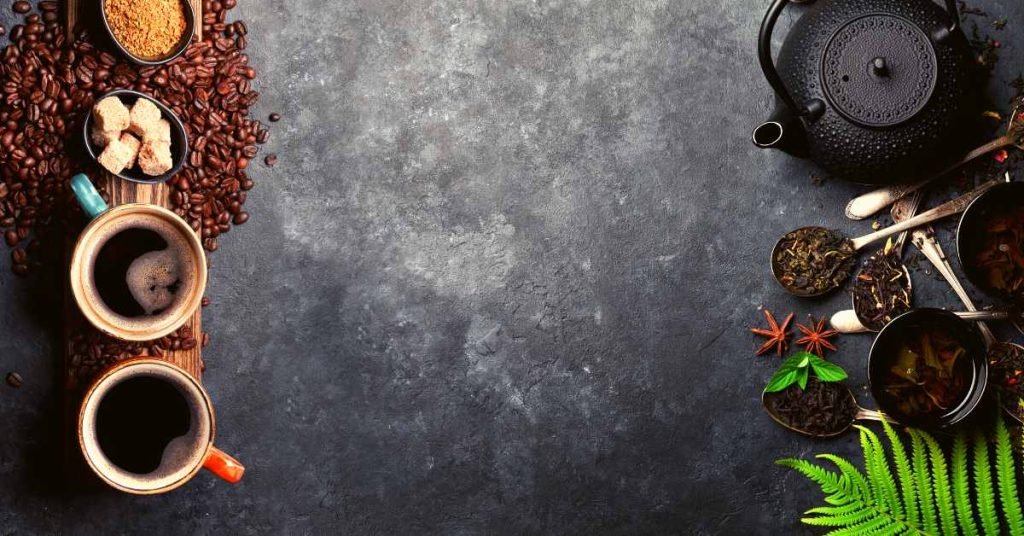Tea and coffee are two of the world’s most popular beverages, each offering a unique set of benefits and flavors.
Coffee, with its bold and robust taste, has been a morning staple for countless people around the globe.
However, in recent years, tea has gained traction as a viable alternative for those seeking a different experience or looking to reduce their caffeine intake. But can tea completely replace coffee?
In this article, we’ll explore the possibilities and considerations surrounding this question.
Understanding the Differences

Before diving into the idea of tea replacing coffee, it’s important to understand the fundamental differences between these two beverages.
Coffee is made from roasted coffee beans, typically containing higher levels of caffeine. It’s known for its bold, bitter flavor and the jolt of energy it provides.
Tea, on the other hand, is brewed from dried tea leaves, which offer a milder, often more nuanced range of flavors, and varying levels of caffeine depending on the type of tea.
Caffeine Content
One of the primary reasons people consider switching from coffee to tea is caffeine content.
Tea generally contains less caffeine than coffee, which makes it an attractive option for those looking to reduce caffeine intake.
For example, a standard 8-ounce cup of coffee contains about 95 milligrams of caffeine, while a cup of black tea contains roughly 40-70 milligrams. Green tea contains even less, usually in the range of 20-45 milligrams.
Health Benefits

Tea is renowned for its health benefits, primarily due to the presence of antioxidants and other compounds that are believed to promote well-being.
Some of the potential health benefits associated with tea consumption include improved heart health, reduced risk of certain types of cancer, and enhanced cognitive function.
Coffee also offers some health benefits, such as increased alertness and potential protection against certain diseases, but its caffeine content can lead to anxiety, jitteriness, and sleep disturbances in some individuals.
Flavor Profiles
The flavor profiles of coffee and tea are vastly different, catering to diverse taste preferences. Coffee is known for its robust, bitter, and sometimes acidic taste.
On the other hand, tea offers a wide range of flavors, from the grassy and vegetal notes of green tea to the bold and malty characteristics of black tea.
Some teas, like herbal teas, can be naturally caffeine-free and provide a variety of pleasant and soothing flavors.
Considering a Complete Replacement

Whether tea can completely replace coffee in your daily routine largely depends on your individual preferences and needs.
Here are some factors to consider when making this decision:
Caffeine Sensitivity
If you are particularly sensitive to caffeine or experience negative side effects from coffee, such as anxiety, jitters, or sleep disturbances, switching to tea may be a sensible choice. Tea’s lower caffeine content can offer a gentler energy boost without the associated drawbacks.
Flavor Preferences
Your personal taste preferences play a significant role in whether tea can replace coffee. If you enjoy the bold, robust flavor of coffee and the experience of a rich espresso or a creamy latte, tea might not provide the same satisfaction. However, if you appreciate the nuanced and diverse flavors of tea, the transition might be more appealing.
Health Considerations
Consider any specific health concerns you might have. If you have a medical condition that requires you to limit caffeine intake or if you’re seeking to harness the potential health benefits of tea, a complete replacement could be a positive move for you. Tea’s antioxidants and lower caffeine content make it a healthier choice for some.
Ritual and Routine

For many people, the act of preparing and savoring coffee is more than just a caffeine boost; it’s a cherished daily ritual. Coffee shops, coffee breaks, and the aroma of freshly brewed coffee can be deeply ingrained in one’s routine. Tea can offer its own rituals and traditions, but it may take some time to adapt to a new routine.
Potential Challenges
While tea can be a wonderful replacement for coffee, there are some challenges to consider:
The Caffeine Kick
If you rely on the caffeine in coffee to kickstart your day or maintain your energy levels, you may find that tea doesn’t provide the same level of stimulation. However, you can opt for higher-caffeine teas like black or oolong, or even combine coffee and tea in your routine for a balanced approach.
Taste Adjustment
If you’re a die-hard coffee enthusiast, it might take some time to adjust to the milder flavors of tea. Experiment with various types of tea to find the ones that appeal to your taste buds the most.
Acquiring Knowledge

Tea can be a complex world to explore. There are numerous types, varieties, and brewing methods to discover. Taking the time to educate yourself about tea can enhance your experience and make the transition from coffee smoother.
Final Word
Whether tea can completely replace coffee depends on your individual preferences and needs.
Tea offers a lower caffeine content, diverse flavor profiles, and numerous health benefits, making it an appealing alternative for many.
However, for those deeply entrenched in coffee culture or heavily reliant on caffeine for energy, the transition to tea may be a more gradual process.
Ultimately, the decision to replace coffee with tea should be based on your goals, health considerations, and flavor preferences.
Many people find that incorporating both beverages into their daily routine provides a balance between the bold and robust world of coffee and the nuanced and diverse realm of tea.
It’s essential to explore and experiment to find the ideal combination that suits your lifestyle and tastes.
MEDICAL DISCLAIMER
Itsnevernotteatime.com cannot and does not contain medical/health advice. The medical/health information is provided for general and educational purposes only and is not a substitute for professional advice.




